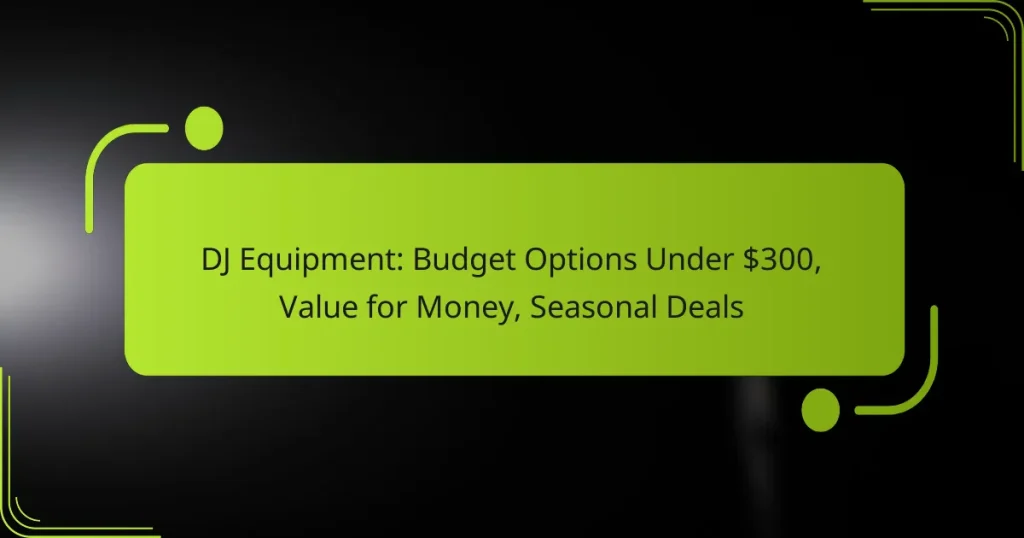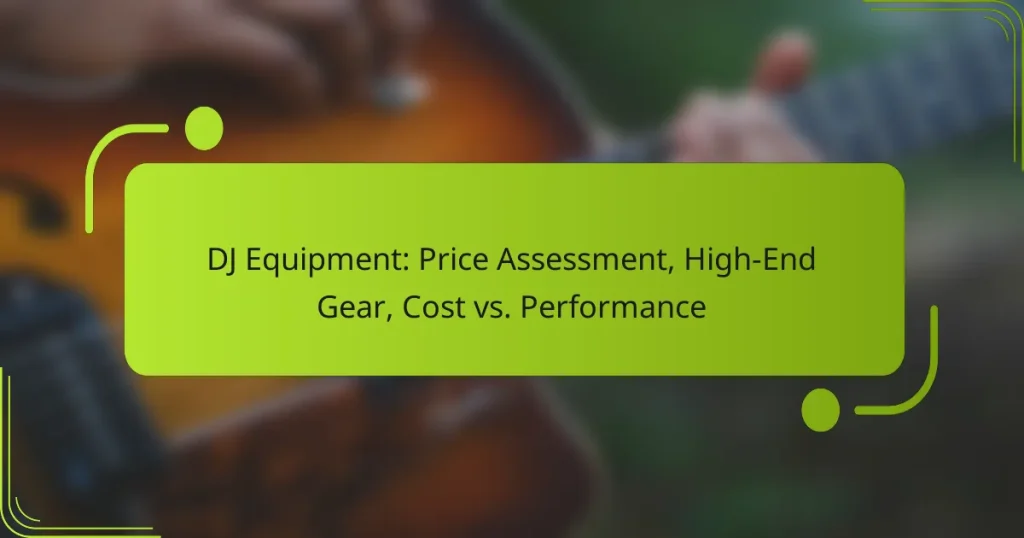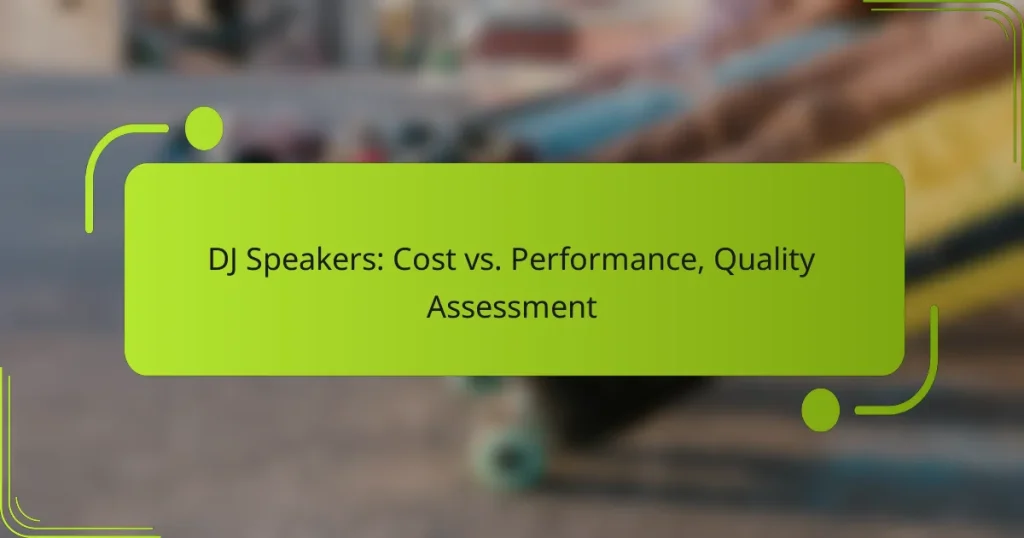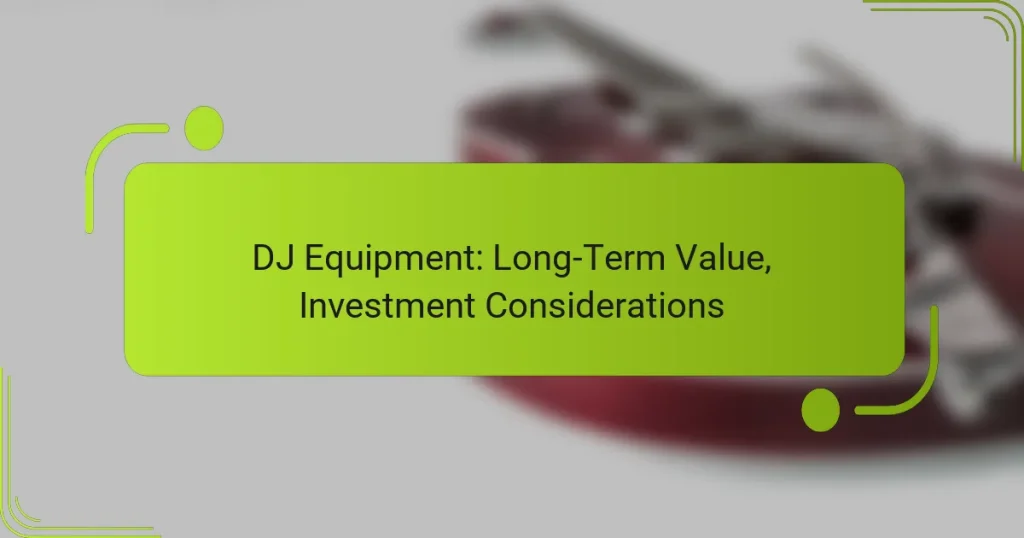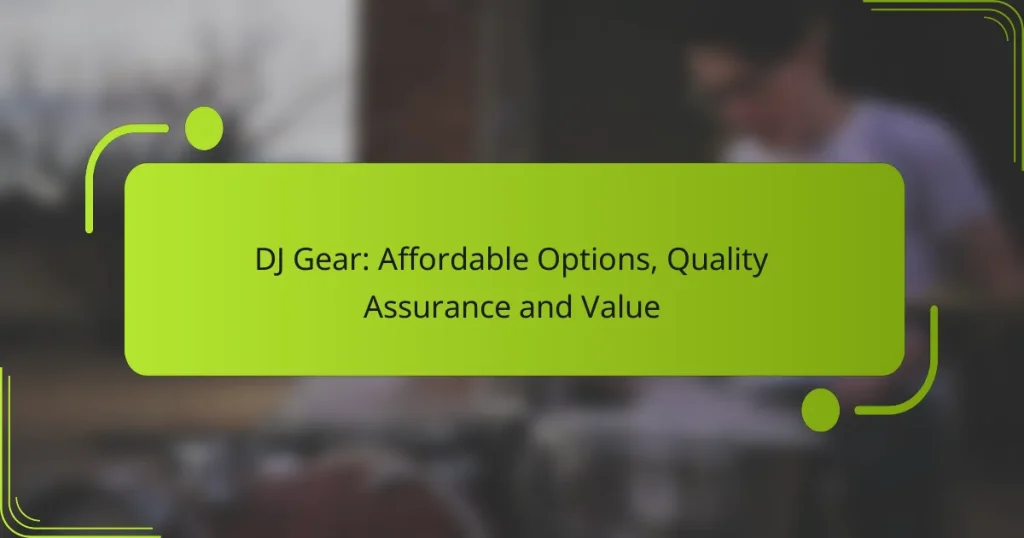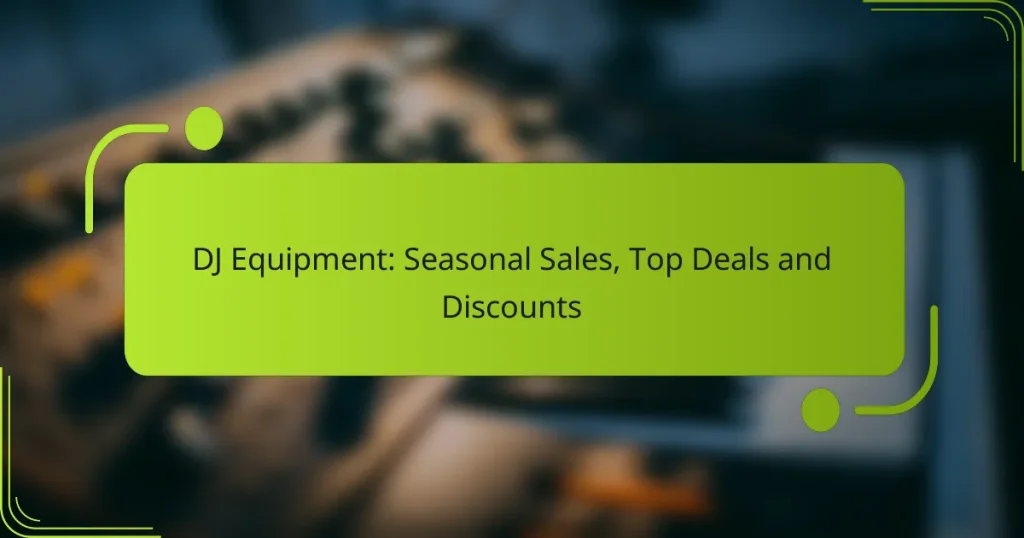Choosing the right DJ equipment is crucial for both beginners and seasoned professionals, as it can greatly influence performance and enjoyment. With a wide range of options available, from budget-friendly controllers to high-end systems, understanding the balance between price and value is essential. This guide will help you navigate the diverse market, focusing on key features like audio quality, portability, and software compatibility to ensure you make an informed decision.
DJ Equipment: Budget Options Under $300, Value for Money, Seasonal Deals
DJ Equipment: Price Assessment, High-End Gear, Cost vs. Performance
DJ Speakers: Cost vs. Performance, Quality Assessment
DJ Equipment: Long-Term Value, Investment Considerations
DJ Gear: Affordable Options, Quality Assurance and Value
DJ Equipment: Seasonal Sales, Top Deals and Discounts
What are the best DJ equipment options for beginners?
The best DJ equipment options for beginners typically include user-friendly controllers that offer essential features without overwhelming complexity. These devices strike a balance between affordability and functionality, making them ideal for those just starting their DJ journey.
Numark Mixtrack Pro FX
The Numark Mixtrack Pro FX is a popular choice for beginners due to its intuitive layout and comprehensive features. It includes a built-in audio interface, two decks, and a range of performance pads for triggering samples and loops.
This controller is compatible with major DJ software like Serato DJ Lite, allowing users to get started quickly. Its price usually falls within the low to mid-hundreds in USD, making it accessible for newcomers.
Pioneer DJ DDJ-400
The Pioneer DJ DDJ-400 is another excellent option for beginners, known for its professional feel and ease of use. It features a layout similar to professional setups, which helps users transition to more advanced gear later on.
This controller comes with a built-in sound card and is designed to work seamlessly with Rekordbox DJ software. Priced similarly to the Mixtrack Pro FX, it typically ranges from the low to mid-hundreds in USD, providing great value for its capabilities.
Hercules DJControl Inpulse 200
The Hercules DJControl Inpulse 200 is designed specifically for beginners, featuring built-in tutorials to help users learn the basics of DJing. Its layout is straightforward, with essential controls easily accessible.
This controller supports DJ software like DJUCED, which offers a user-friendly interface. Its price is often lower than the other options, usually in the lower hundreds in USD, making it a budget-friendly choice for aspiring DJs.
How much does DJ equipment cost in the UK?
The cost of DJ equipment in the UK varies widely based on quality and features, ranging from budget-friendly options to professional-grade gear. Entry-level setups can start under £200, while high-end systems may exceed £800, reflecting the diverse needs of DJs at different experience levels.
Entry-level equipment under £200
Entry-level DJ equipment typically includes basic controllers, headphones, and speakers, making it accessible for beginners. Popular choices in this price range often feature essential functionalities without advanced features, ideal for learning the basics of mixing and beat matching.
Examples of entry-level gear include compact DJ controllers like the Numark Mixtrack Pro or the Hercules DJControl Inpulse, which usually retail between £100 and £200. These options provide a solid foundation for new DJs without a significant financial commitment.
Mid-range options between £200-£800
Mid-range DJ equipment offers enhanced features and better build quality, catering to more serious hobbyists and semi-professionals. This category includes versatile controllers, higher-quality speakers, and more advanced software capabilities, allowing for greater creativity and performance.
Models such as the Pioneer DDJ-SB3 or the Denon DJ Prime GO fall within this range, typically priced from £300 to £600. Investing in mid-range gear can significantly improve sound quality and performance, making it a worthwhile consideration for those looking to advance their skills.
High-end gear over £800
High-end DJ equipment is designed for professional use, featuring top-tier components and advanced functionalities. This category includes premium controllers, mixers, and sound systems that deliver exceptional audio quality and reliability for live performances.
Notable examples include the Pioneer DJ DJM-900NXS2 mixer and the Denon DJ SC6000 Prime media player, often priced above £1,000. While this investment is substantial, it provides professionals with the tools needed for high-stakes environments and demanding gigs.
What features should I look for in DJ equipment?
When selecting DJ equipment, prioritize audio quality, portability, and software compatibility. These features significantly impact your performance and overall experience, whether you are a beginner or a seasoned DJ.
Audio quality and sound output
Audio quality is crucial for delivering a great performance. Look for equipment that supports high-resolution audio formats and has a low total harmonic distortion (THD) rating. A good starting point is equipment that offers a frequency response range of at least 20 Hz to 20 kHz.
Consider the sound output capabilities, such as wattage and speaker size, which can affect how well the sound carries in different venues. For instance, a portable speaker with around 100 watts is typically adequate for small to medium-sized events.
Portability and build quality
Portability is essential for DJs who travel frequently. Choose lightweight and compact equipment that is easy to transport, such as foldable stands and cases. Many modern DJ controllers are designed to be portable without sacrificing functionality.
Build quality should not be overlooked; durable materials can withstand the rigors of travel and performance. Look for equipment with metal chassis and rugged components, which can last longer and perform better in various environments.
Software compatibility
Ensure your DJ equipment is compatible with popular DJ software like Serato, Traktor, or Rekordbox. Compatibility can enhance your workflow and allow for seamless integration with your existing setup.
Check for features like plug-and-play functionality and MIDI mapping capabilities, which can simplify the setup process. Additionally, consider whether the software offers regular updates and support for new features, as this can extend the lifespan of your equipment.
How do I compare DJ equipment brands?
To compare DJ equipment brands effectively, focus on key factors such as sound quality, build durability, features, and price. Look for user reviews and expert opinions to gauge performance and reliability across different brands.
Pioneer DJ vs. Numark
Pioneer DJ is often recognized for its high-quality products and professional-grade equipment, making it a favorite among serious DJs. Numark, on the other hand, tends to offer more budget-friendly options that are great for beginners or casual users.
When comparing these brands, consider the specific models and their features. Pioneer DJ mixers and controllers typically come with advanced functionalities, while Numark products may provide essential features at a lower price point, often ranging from $100 to $800.
Denon DJ vs. Rane
Denon DJ is known for its innovative technology and high-performance gear, appealing to both professional and semi-professional DJs. Rane is celebrated for its rugged build quality and reliable performance, particularly in live settings.
In terms of pricing, Denon DJ products can range from $300 to over $2,000, depending on the complexity and features. Rane equipment is similarly priced, with a focus on durability and sound quality, making it a solid choice for those who perform frequently.
Native Instruments vs. Hercules
Native Instruments specializes in software and hardware that integrates seamlessly, particularly for digital DJs who utilize software like Traktor. Hercules, while offering a range of controllers, is often seen as more entry-level, making it accessible for newcomers.
Native Instruments products typically range from $200 to $1,500, reflecting their advanced capabilities. Hercules controllers are generally priced lower, often between $100 and $300, providing a good starting point for those new to DJing.
What are the top-rated DJ controllers for 2023?
The top-rated DJ controllers for 2023 combine advanced features, user-friendly interfaces, and solid build quality, catering to both beginners and professionals. Key considerations include compatibility with software, portability, and price, which typically ranges from a few hundred to over a thousand dollars.
Pioneer DJ DDJ-FLX6
The Pioneer DJ DDJ-FLX6 stands out for its versatility and performance capabilities. It features a 4-channel mixer, large jog wheels, and a range of effects that allow DJs to create seamless transitions and dynamic mixes.
This controller is compatible with both Rekordbox and Serato DJ Pro, making it a flexible choice for various setups. Its robust build ensures durability, while the intuitive layout helps users navigate easily during live performances.
Reloop Beatpad 2
The Reloop Beatpad 2 is designed with mobile DJs in mind, offering a compact and portable solution without sacrificing functionality. It includes a built-in audio interface and is optimized for use with iOS devices, making it ideal for on-the-go performances.
This controller features touch-sensitive pads, which are perfect for triggering samples and loops. Its integration with DJ software like Algoriddim’s djay enhances its usability, allowing for creative mixing and effects manipulation.
Akai Professional APC40 MKII
The Akai Professional APC40 MKII is tailored for Ableton Live users, providing a seamless experience for live performances and studio work. Its clip-launching grid and faders allow for intuitive control over tracks and effects, making it a favorite among electronic music producers.
This controller’s layout is designed to facilitate quick access to essential functions, which is crucial during live sets. Additionally, its sturdy construction ensures it can withstand the rigors of frequent transport and use.
How do I maintain my DJ equipment?
Maintaining your DJ equipment is essential for optimal performance and longevity. Regular upkeep involves cleaning, software updates, and checking for any wear and tear to ensure everything functions smoothly.
Regular cleaning and dusting
Keeping your DJ equipment clean is crucial to prevent dust buildup that can affect performance. Use a microfiber cloth to gently wipe surfaces, and consider using compressed air to clear out dust from crevices.
Establish a cleaning routine, ideally once a week or after each gig, to maintain your gear. Pay special attention to areas like mixers, turntables, and controllers where dust can accumulate easily.
Software updates and firmware checks
Regularly updating your DJ software and firmware is vital for compatibility and performance enhancements. Check for updates from manufacturers at least once a month to ensure you have the latest features and security patches.
Before a performance, verify that your software is up to date and functioning correctly. This practice can help avoid unexpected issues during a set, ensuring a seamless experience for both you and your audience.

